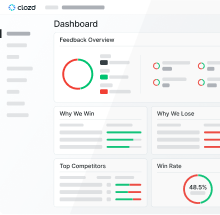
Product marketers, more and more, are implementing win-loss analysis programs to bring value to their organizations. Other departments’ performance can be directly tied to revenue, but working in a strategic role, showing value can be more difficult. Win-loss analysis can be that catalyst.
Spencer Dent, co-founder of Clozd, sat down with Senior Product Marketing Manager, Ethan Prete from MX and talked about the value win-loss analysis can bring to product marketers, how it can help give them a “seat at the table”, and best ways to conduct a successful win-loss analysis program.
How Win-Loss Analysis Can Enable Product Marketers to Do Their Job Better
Ethan said a lot of the time, product marketers struggle having the attribution to show the value they bring, because when you think about other departments, they’re very much tied to revenue.
"One of the things we found is we have a seat at the table when we can identify the how and the why.”
-Ethan Prete
He said every week his team sends an email to their CEO with a win-loss report—a report that shows exactly why deals are won or lost, suggestions on how to improve win rates, and data to back up those claims.
Ethan then compared win-loss analysis to advanced basketball statistics. You can look at the box score, or the end result, and get a clear picture of what’s going on—a clear winner and loser. But what it doesn’t tell you is what happened throughout the game. It doesn’t give you any insights on how to improve, how to increase your scoring average, or up your defensive game. It doesn’t tell you anything except that you won or lost. That’s what win-loss analysis can do. It gives you the play-by-play. It gives you the strategic insights on where to improve or where to double down. It gives you feedback that helps you win more.
Win-Loss Analysis Defined
Spencer defined win-loss analysis as a systematic, operationalized approach for how you understand why you win and why you lose deals.
He then cautioned that one mistake Clozd has seen people make in their win-loss journey is thinking of it too narrowly. The job isn’t done with a one-off “tiger team”. Win-loss analysis needs to be an ongoing, systematic process so you can truly get the best data and insights possible to improve your win rates.
When done systematically and ongoing, you’re able to see what’s happening to your win rate, why that’s happening, who your competitors are, where you’re strong and weak against them, and, ultimately, how to improve upon that data.
Win-loss Adds Value to Each Department
Ethan and Spencer then talked about how win-loss analysis can be used across the organization—sales leaders, marketing teams, product managers, etc. Though the program sits with product marketing, the value it adds trickles across the organization.
It’s important to identify the roles everyone plays and how everything works together. Ethan tells a story of a surprising win. MX found out through their win analysis that they won a deal over several competitors, even though their price was remarkably higher. The customer said even though they were paying more, it was worth the price point because they loved the customer support and MX’s mission and vision. Ethan mentioned that they’d heard this feedback before but with the actual words from the buyer, they were able to take that data they’d previously had supporting that, combine it with the win-loss interview feedback and talk to their customer support team about what they’re doing and how to ensure it continues. The product marketing team then went to sales and offered to create some assets specifically about the company’s customer support team, which was clearly an under-utilized selling point.
All teams throughout the organization can work together to improve when they have the right information. The product marketers can work as the conduit to connect everyone to the themes they’re finding.
"Capturing that voice of the buyer & getting that into the right hands of departmental leaders that can then take that info & use it to improve the sales process or the marketing messaging or the product. If you become that source, that conduit to the market for your organization, THAT’S the seat at the table.”
- Ethan Prete
Win-loss Analysis Allows You To Be Proactive
Win-loss analysis allows you to be proactive—especially when things are going well and you’re winning deals. You should be using win-loss feedback to really expand on what’s going well so you can be prepared to ensure you continue to win moving forward. Just because you’re winning doesn’t mean the feedback loop stops. Feedback from wins can help you to make smarter decisions for the future to retain win rates. For example, if you see from your win-loss feedback that your product is needing a feature, proper win-loss analysis can help show the potential need to reallocate resources over to the engineering org to work on those features that will help you to continue winning more.
“Just start the damn program.”
As put by another awesome Clozd user, just start the damn program. You can overbake it way too much and waste valuable time trying to create the perfect program. Just getting it started will help you figure out how to shape it as you move forward. There isn’t a one-size-fits-all approach but getting started is the quickest way to show its value.
“The way you diagnose and set up your win-loss program for your company depends upon the composition of your pipeline.”
- Spencer Dent
Ethan’s parting wisdom for product marketers? Be strategic and recognize the value that can come from win-loss analysis.
Win-loss analysis is one of the best ways to blaze trails for yourself as well as new product marketers coming into the industry. “Why do we win and lose” and “how do we use that info to impact the business?” Product marketers can get those answers, and those answers are instrumental in helping your company start winning more.
Click here if you’re interested in learning more about a tech-enabled win-loss analysis program.











.svg)










.svg)

.svg)




